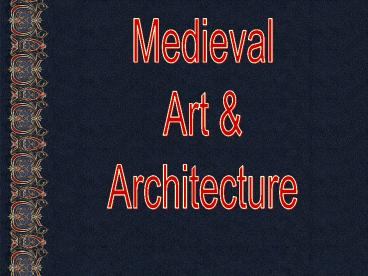Late%20Medieval%20Art%20 - PowerPoint PPT Presentation
Title:
Late%20Medieval%20Art%20
Description:
Flying Buttress St. Etienne, Bourges, late 12c Flying Buttresses Gothic Floor Plans Gothic Cathedral Architectural Style Began in France in the 12c. – PowerPoint PPT presentation
Number of Views:197
Avg rating:3.0/5.0
Title: Late%20Medieval%20Art%20
1
Medieval Art Architecture
2
Medieval Times
- In the 11th century, Europe social structure was
based on a system called Feudalism. Feudalism
was the social order where the peasants provided
labor and military service to a lord in return
for the use of his land. This meant that
peasants were considered the lowest in the
society and got very little food and respect.
They also had to pay the most tax money back to
their lords. Because the system was not fair to
everyone it often caused fights amongst the
people. When the peasants started to get more
control over their own lives, they would turn to
the Christian religion for stability.
3
Feudal system
4
- This is why they began to build large churches
called cathedrals that could hold lots of people.
These first churches are described as
Romanesque. Romanesque buildings were made of
stone, but often had wooden roofs because people
were still not very good at building stone roofs
yet. If they did have stone roofs, the walls had
to be very thick in order to hold up the roof.
This meant there couldn't be very many windows
either, so Romanesque buildings were often very
heavy and dark inside. They had round arches,
like the classical buildings of Rome, and
decorated them with carvings of people or
animals.
5
Chartres Cathedral, Paris
6
RomanesqueFloor Plans
7
RomanesqueCathedralArchitectural Style
- Rounded Arches.
- Barrel vaults.
- Thick walls.
- Darker, simplistic interiors.
- Small windows, usually at the top of the wall.
8
Interior of a RomanesqueCathedral
Note the rounded arches and the small windows.
9
Gothic Cathedrals
10
Notre Dame Cathedral, Paris
11
- After the Romanesque period in architecture,
around 1200 AD, most people began to build
Christian churches and palaces in the Gothic
style. The easiest difference to see between the
two styles is that while Romanesque churches have
round arches, Gothic churches have pointed
arches. But there are a lot of other differences
as well. Gothic cathedrals have lots of windows
to let in more light so they are not as dark as
Romanesque churches.
12
Interior of a Gothic Cathedral
13
Interior of a Gothic Cathedral
14
- They were able to do this because the architects
found some new ways of building stone roofs that
the walls could support. One of these was called
the flying buttress. It was something outside the
church that pushed against the wall so the
building wouldnt fall over. Gothic churches are
also usually bigger than Romanesque churches. By
1200 AD people had more money available, and they
could afford to spend more on building great
churches.
15
Flying Buttress
16
St. Etienne, Bourges, late 12c
Flying Buttresses
17
Gothic Floor Plans
18
Gothic CathedralArchitectural Style
- Began in France in the 12c.
- Pointed arches.
- Flying buttresses.
- Stained glass windows.
- Elaborate, ornate interior.
- Taller, more airy ? lots of light.
- Lots of sculpture ? larger-than-life.
19
Gothic Filigree Closeups
20
Chartres Cathedral, Paris
Many churches were very richly decorated, both
inside and out. Here we see important figures in
history and tales from the Bible.
21
Cathedral Gargoyles
22
- Perhaps one of the most interesting features of
Gothic architecture are the figures of the
grotesques, the gargoyles. Although they fit
every stereotype about evil creatures, they are
instead guardians of the buildings which they
sit. A gargoyle is actually a carved spout which
takes water away from the sides of building just
like a eves trough on a house. There are similar
sculptures that do not carry away water and are
and simply ornamental are called chimera.
Nowadays it is common for both types of carvings
to be referred to as gargoyles.
23
Stained Glass Windows
- The term stained glass can refer to the material
of colored glass. Throughout its history, the
term "stained glass" has been applied almost
exclusively to the windows of churches, cathedrals
, chapels, and other significant buildings.
Stained glass, as an art form, reached its height
in the Middle Ages when it became a major way to
communicate using pictures about the Bible
because most people couldnt read
24
Rose Window
A Rose window is often used as a generic term
applied to a round window, but is especially used
for those found in churches of the Gothic
architectural style and being divided into
segments by a dark frame.
25
Rose WindowDesigns of Various Kinds
Original Design
Labyrinth, 1200
Buddhist Mandala
26
Which Interior Is Which?
27
Illuminated Manuscripts
An illuminated manuscript is a page from an old
book where the words are surrounded by
decorations fancy letters, borders and small
pictures. These were made as a way of giving
respect to ancient documents that help them
survive during the periods just after Feudalism.
28
Illuminated Manuscripts
29
Medieval Tapestriesfrom theWorkshops in Flanders
The Lady the Unicorns, 1511
30
Late Medieval Church Art
Chalice, paten, and straw, mid-13c
Relinquary, late 12c
31
Late Medieval Art
- St. FrancisRule Approved
- Giotto
- 1288-92?
- Tempera on wood and ground gold.
32
Medieval Religious Themes
- The Epiphany
- Giotto
- 1320
- Tempera on wood and ground gold.
33
The Crucifixion
- Giotto
- 1305
- Tempera onwood andground gold.





























![get [PDF] DOWNLOAD Who is That? The Late Late Viewers Guide PowerPoint PPT Presentation](https://s3.amazonaws.com/images.powershow.com/10092070.th0.jpg?_=20240803086)

